Atl School Cannabis Users Use 1 indica as Body or Physical Sensation Again Not Thinking
Everywhere yous plow today, it seems somebody is talking nearly cannabis.
Some of the information we hear virtually cannabis is alien, making it hard to empathize the ways it may touch on our children. Is it addictive? Does information technology cause psychosis? Is it really a medicine? What will happen if my child uses it? What should I tell—or not tell—my child about information technology?
As cannabis has now been legalized for adults in Canada, the Canadian Constitute for Substance Use Research has revised and updated a previous resource adult in partnership with the F.O.R.C.E. Guild for Kids' Mental Wellness and the Canadian Mental Health Clan (BC Division). This new edition retains the aim of the earlier work.
Our goal is to offer yous an honest and thoughtful give-and-take on cannabis and so you lot can make better decisions about cannabis use—or non-use—in the context of your family unit.
Hemp. Cannabis. Marijuana. Hash.
Chances are you've heard these words before, though you many not know the divergence between them. Are they the same or different? The answer is "both."
HEMP is a plant that, like other plants, has roots, a stalk, leaves, flowers and seeds. Hemp stalks are ofttimes used to brand fibre-based items such equally paper and material.
CANNABIS is the scientific name for the hemp institute. There are many different kinds of cannabis. The leaves and flowers of each kind produce varying mind-altering and medicinal effects when smoked or consumed. The most talked-about strains of the hemp plant are cannabis sativa and cannabis indica.
MARIJUANA is a Mexican slang give-and-take for cannabis leaves and flowers (aka buds).
HASH, short for hashish, is made of pressed resin from cannabis buds, and is therefore stronger in outcome.
Superlative
You may have heard...
You may have heard a multifariousness of claims about cannabis in the media or in everyday conversation. For instance, yous may accept heard that cannabis utilize causes cancer or leads to quitting school. You may accept also heard that the risk of developing cancer is depression for cannabis smokers and that the drug tin assist save anxiety most school.
As a parent, making sense of these conflicting claims tin can be confusing. While there is at least some truth in virtually all of them, accurate and balanced information about cannabis is more complex than elementary statements.

There are no simple answers to explain the means cannabis utilise may affect people's minds, bodies, relationships and time to come opportunities. Why? Because people are complex beings, and our choices and behaviours are complex too.
Fifty-fifty if you take only limited experience with drugs, you lot probable know more than you call back virtually the key issues. Most people, for example, understand intuitively that all drugs can be both good and bad. Even medication recommended by a md can crusade harm, especially if not taken properly. When it comes to cannabis, almost everyone knows people who have had fun or benefitted in some other mode from using cannabis or other drugs. As well, most people know of someone who has had bad experiences.
While almost drugs are useful in some way, all drug use carries some run a risk. Generally, it is safest non to utilise any drug unless ane can be sure the potential benefits conspicuously outweigh the potential harms. This includes assessing the context and reasons for use.
Information technology can aid to think of drug employ every bit occurring within a matrix with 2 separate axes representing potential benefit and potential impairment (encounter the illustration). Different types of use have dissimilar do good/harm profiles, merely even these alter depending on many factors.
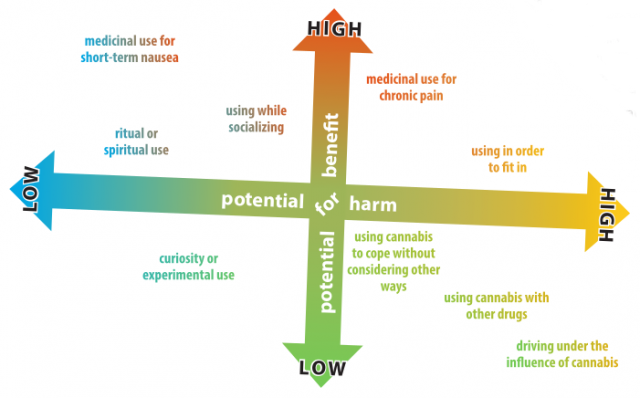
The potential that drug use might lead to certain harms and/or benefits is influenced past several things:
-
More drug equals more risk. Increased risk is linked with a greater amount and more frequent drug use, and higher force of a drug.
-
Younger age equals more risk. The younger a person is when they start using a drug regularly, the more likely they are to experience harms or develop problematic substance use subsequently in life.
-
Places, times and activities influence risk. Trying cannabis with friends at a weekend party and walking home later is less likely to upshot in impairment than smoking cannabis on schoolhouse property or driving nether the influence.
-
The reasons young people use cannabis are important. Curiosity or experimentation oftentimes lead only to occasional utilize. Youth may apply cannabis every bit a way to feel improve, reducing anxiety in social situations and helping them connect with friends. While using cannabis can help reduce the symptoms of anxiety and depression, if immature people use cannabis regularly to ease troubling feelings, utilise can get problematic. If a youth uses cannabis to perform better at school or fit in with a particular group, they may exist listening to others, rather than valuing their own needs and wants, which can upshot in poor choices.
The reasons a immature person uses cannabis, family history, the context, corporeality and way in which they use the drug all contribute to whether that use is benign, harmful, or both. Risks related to cannabis use vary from person to person, and sometimes, from mean solar day to mean solar day for a item person. This can brand deciding if, when and how to use cannabis difficult. Parents often have to weigh potential benefits and harms, and guide decisions in their particular family situation.
So, with this in heed, and in light of what the research tells united states of america, permit's have a closer expect at some of the mutual claims virtually cannabis.
PSYCHOACTIVE SUBSTANCES are drugs that bear on our central nervous system (especially the brain) and make us see, think, feel, and deport differently than nosotros unremarkably do.
Height
Common claims virtually cannabis
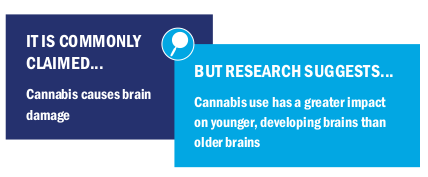
The man brain begins to develop in the womb just is not fully formed until well into adulthood. Drugs influence the way our brains develop. Regular cannabis use at an early historic period may have negative effects on brain development.
All psychoactive substances, from caffeine to heroin, have an firsthand effect on the brain. The negative effects of cannabis, however, are much less than the effects of some substances such as booze.
While the negative effects of cannabis on the brain are ofttimes minimal and reversible, exposure to psychoactive substances during development should be minimized.

Available testify cannot answer whether or not cannabis causes psychosis. But it does reveal an association betwixt the two, with greater gamble of psychosis for people who use cannabis often.
Cannabis may be one factor that interacts with other factors, such every bit a vulnerability to psychosis. For instance, someone with a family history of psychosis may be more than sensitive to the potential psychosis-producing properties of cannabis than people without this vulnerability in their family.
That said, for some people, cannabis employ can upshot in short-term psychotic symptoms such as unusual perceptions and feelings (e.g., they may hear voices or call back someone is trying to harm them). Cannabis utilize can also negatively bear on a person living with a psychotic disorder such as schizophrenia.
Studies on the effects of cannabis use on low are also inconclusive. Some show suggests a link between frequent cannabis utilise and depression. But it is non clear how much of the human relationship is based on cannabis apply and how much is due to other factors such every bit family and social problems, living in poverty and other situations that may be beyond the person's command.

Fifty-fifty though cannabis smoke contains carcinogens (cancer-causing toxins), the take chances of developing some cancers (e.g., mouth, tongue and lung) is less for cannabis smokers than tobacco smokers. This is because cannabis smokers tend to smoke less. Cannabis smokers typically smoke one to three cannabis cigarettes a day compared to 10 to thirty tobacco cigarettes by tobacco smokers.
Another factor is related to the properties of the cannabis found. For example, cannabis contains chemicals called cannabinoids, which some scientists think play a protective office against cancer in the lungs.

While there is an association between cannabis and quitting school, the linkages may exist the result of common factors— personality traits or family bug, for instance—that increase the risks of both cannabis use and dropping out of school. Or school policy related to cannabis use may be the crusade. For instance, a zero-tolerance schoolhouse policy for drug use, which isolates suspended students from their peers and teachers, may be more likely to lead to a student dropping out than drug use itself.

While at that place is an clan between cannabis utilize and the employ of other illicit drugs, the apparent linkages are related to personal, social and environmental factors rather than the effects of the drug.
Personal factors include particular personality traits (east.g., sensation seeking) which might drive a young person to use cannabis and go on to endeavour other illicit drugs. Or a young person might try cannabis to relieve symptoms of a mental wellness problem (east.one thousand., feet) and experiment with other substances to see if they take the same effect.
Social and environmental factors related to the use of other illicit drugs include how acceptable particular drugs are in the immature person'due south social grouping, and how available they are in their customs.
As parents, thinking almost cannabis and making decisions with your family can be a complex and challenging job. Personal history and attitudes to drug utilise, family values, medical history, legal status, community mores, and individual desires are factors that can affect what you choose to exercise. Thoughtful consideration of the issues can take some fourth dimension. It is important to remember that y'all volition make the all-time decision you can at that moment. Yous can re-evaluate your position and make different decisions as the situation and data available changes.
Is cannabis legal?
Cannabis is regulated in the province of BC. You must be xix or over to buy, possess or apply cannabis or cannabis products for not-medical purposes in BC. It is illegal to sell or give cannabis to people under 19. People under 19 may not legally possess cannabis unless authorized to use it for medical purposes by their health intendance practitioner. Access to medical cannabis is regulated nether the Access to Cannabis for Medical Purposes Regulations (ACMPR). Under the ACMPR, Canadians (including those nether 19) who have been authorized by their health intendance practitioner to access cannabis for medical purposes are able to purchase prophylactic, quality-controlled cannabis from ane of the producers licensed past Health Canada, produce a limited corporeality of cannabis for their ain medical purposes, or designate someone to produce it for them.
For more than information on cannabis regulations in BC visit: http://cannabis.gov.bc.ca/
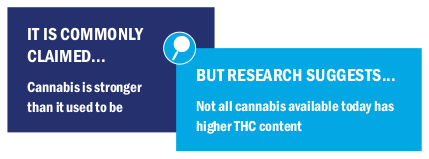
Data on the potency or strength of cannabis is express, just the available evidence suggests in that location is a broad range in levels of THC (the main psychoactive ingredient). While there has been an increase in the average THC level over the past two decades, the rise has not been dramatic. Increases in THC levels are primarily related to selective breeding and more advanced cultivation techniques.
While the long-term negative effects of higher-dominance cannabis on respiratory wellness or mental wellness are unknown, some researchers point out that using smaller amounts of higher potency cannabis reduces a person's exposure to fume and toxins and therefore might reduce risks. Clinical studies have shown that smokers regulate their dosage according to the strength of the cannabis by taking smaller or fewer puffs and/or inhaling more air with their puffs.
Cannabis purchased through government outlets in BC is tested for quality. If purchased from a dealer or friend the THC content may non exist known, and people may utilize more than desired, and, in doing so, may feel negative consequences.
What is THC?
THC is brusk for the chemical compound delta-nine-tetrahydrocannabidinol. THC is the most talked-most active ingredient in cannabis because it delivers the "high" feeling associated with using the drug.

Cannabis affects driving ability, including reaction fourth dimension, lane maintenance, information processing, speed and distance estimation, eye movement command and attending. Information technology also causes fatigue, which is itself a driving hazard. For these reasons, it is safest to avoid driving for iii to four hours after using cannabis.
Cannabis in combination with even pocket-size doses of alcohol is a greater threat to safety than either drug used alone.

In the three to four hours after using cannabis, a person may have bug remembering or learning things. If a young person uses cannabis before or during school or work, these effects could impair their ability to do well in school or perform at piece of work. However, most of the prove suggests that any long-lasting furnishings on learning and memory are minimal.
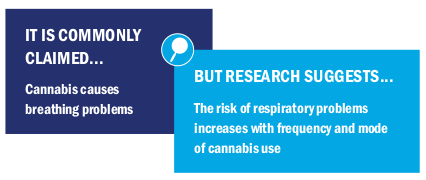
Any kind of fume can irritate the respiratory tract. People who smoke cannabis on a regular basis can develop inflammation in their respiratory tract (the function of the body involved in animate). This can put them at adventure of chronic coughing, shortness of jiff and wheezing.
Using a device chosen a vaporizer can reduce the adventure of respiratory problems. Only "safest" does not mean "no gamble." Using a vaporizer simply reduces smoking-related risks, not those related to the drug itself.
Comparing common means to employ cannabis
Some ways of smoking cannabis are safer than others. For example, using unfiltered joints is less risky than using water pipes (aka bongs) and joints with cigarette filters.
With unfiltered joints, cannabis smokers inhale less tar and more THC, the agile ingredient in cannabis. Cigarette filters and water pipes reduce the THC, leading smokers to inhale more vigorously and increase the corporeality of tar in their lungs.
Vaporizers are the safest way to use cannabis. They release THC as a fine mist while reducing the toxic past-products of smoked cannabis. Ingesting cannabis also avoids the risks related to smoke and toxins but introduces other concerns. For instance, information technology is harder to discover the right dose because it takes longer for the trunk to absorb the THC. This tin can result in a person using more than they intended and maybe having a negative or fifty-fifty scary experience.

While most people who use cannabis exercise non progress to problematic utilize, those who use cannabis frequently (daily or near daily) over a flow of time may be putting themselves at risk of dependence.
A person may be dependent if they experience like they need to use cannabis but to feel normal and function during the day. People who stop using cannabis subsequently regular use tin experience mild feelings of withdrawal. Mutual symptoms of cannabis withdrawal are restlessness, nervousness, irritability, loss of appetite and difficulty sleeping.
The risk of developing dependence is higher for those who start to utilise cannabis regularly at an early historic period.
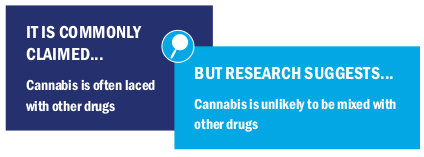
While some people worry that cannabis sold on the streets may exist laced with crystal meth or other unpredictable substances, there is picayune evidence of this happening.
It is important to know the source of your cannabis. Buying from regime distribution centres is safest.
Superlative
Exploring medical cannabis use
Cannabis has been used equally a medicine in many parts of the world for thousands of years. These days, many people in Canada want more than evidence about what cannabis is (and is not) effective in treating, and the best way to evangelize that treatment.
As it stands today, there is scientific evidence of the therapeutic benefits of cannabis for the following weather condition: anti-spasm for multiple sclerosis, anti-convulsive for epilepsy, anti-nausea for chemotherapy, and appetite stimulant for people experiencing extreme weight loss. Recent research has shown cannabis is effective in managing pain.
Although cannabis tin can impact mental wellness in certain circumstances, some people with a mental health problem apply it to relieve the symptoms of their condition or the unpleasant side effects of their medication.
When it comes to youth, enquiry suggests that young people may be using cannabis for reasons that are like to those of adults. Some studies propose that youth experiencing mental wellness problems might be seeking relief through cannabis apply. Mental health bug such as depression, indisposition and anxiety were reported as meaning bug that interfered with their ability to function at school and with family and friends.
More enquiry is needed to empathise whether cannabis may have a place amidst handling options for mental health problems such as anxiety and ADHD. For instance, evidence shows that cannabis has the potential to both increase and reduce anxiety. Some researchers believe these alien furnishings may be a reflection of the various cannabinoids in cannabis.
THC and other compounds in cannabis—notably CBD or cannabidiol—are being studied for their healing potential. Researchers believe that the ratio of THC to CBD is a crucial factor in how cannabis affects a person'south mind and body.
Peak
Y'all and your child
When yous're thinking nearly talking with your kid about drugs, knowing about some of the risks (and benefits) of cannabis use may assist you lot feel more prepared. Just it is non the most important mode y'all tin help your child navigate their world, a globe where drug use is common.
More than information nearly cannabis, what your child needs is Y'all. Inquiry suggests that one of the virtually important factors in good for you child development is a strong, open human relationship with a parent.
Intuitively, virtually of us already know this. Only sometimes it helps to remind ourselves that it is our attention, beloved and patience that really count. Information technology may too exist helpful to recall that, ultimately, our goal as parents is to notice means to inspire our children to want to communicate with the states—almost cannabis or anything else.
Opening up a discussion most cannabis may be ane way to strengthen your relationship with your kid. It may encourage open lines of communication nearly other topics also. Inviting and allowing open up, honest conversation most cannabis (or any other subject) makes your child know that what they are thinking, feeling and experiencing matters to y'all.
The exact words you use are less important than the underlying message yous are sending—engaging in conversation with them says that y'all want to establish a connection with them, ane that yous hope lasts for a long fourth dimension.

Connecting through conversation
Talking most cannabis or other drugs may not always be easy, fun or comfortable. But it may assistance to keep in mind that most people with kids struggle with parenting at least some of the fourth dimension. No affair what you lot are going through as a parent, chances are there are others going through the verbal aforementioned thing. In other words, you lot are non lonely in your fears and frustrations—or in the joys and triumphs—of existence a parent.
Starting a conversation
Some parents wonder when, where and how to start a conversation about cannabis. They ask themselves or others, "What age is the right age to start talking virtually drugs?" or "Should I inquire the questions or should I wait until my kid asks me something?"
Every kid is different, then there is no "right historic period" to first talking well-nigh cannabis. But it makes sense to have your first conversation before your kid is likely to try using cannabis. That style, yous can plant a connection and share your expectations earlier they are exposed to whatsoever risks associated with cannabis.
At that place is no dominion about how or where a conversation most cannabis should commencement either. But considering how oft drugs are talked about on TV, in the newspaper, on social media, and at schoolhouse, the subject might easily be brought upwardly naturally while watching a movie together or while swapping stories well-nigh what happened at work and school that day.
Another "natural" way to offset a conversation virtually cannabis is to bring it up in the context of other drug employ. For example, if y'all are planning to visit a relative who uses tobacco, you could inform your child almost it and enquire them what they know most smoking or how they experience about smoking. Or if you are having a beer or taking medication, you could ask, "Why do you call up some people accept the use of alcohol and medication but not cannabis?"
It may be more comfortable to talk when you are not sitting across the table looking straight at each other. Try starting a chat in the car or on the basketball game court. Y'all could say, "I've heard things on the news virtually kids smoking pot at school. How about your school? How does your primary deal with students who use drugs?"
Monitoring your motives
The goal of open communication is to go your kid talking and sharing their thoughts and feelings with you lot. Ideally, they will one twenty-four hours enquire you what yous recollect and feel about things likewise. Establishing a connection through conversation is more than important than assessing the details of what they tell you. After all, it is not actually an open conversation if you are only inviting your child to talk so yous can jump on them for ideas yous exercise not like.
Practising good conversation skills
Your kid, like anyone else you talk to, volition be a better conversation partner if y'all stick to some basic rules about communication.
-
Exist a skilful listener. Avoid the temptation to shower them with wisdom, and allow them do at least half of the
-
Acknowledge their point of view. This does non mean y'all accept to agree with what they say, just instead, to endeavour non to react in a style that will shut down their desire to tell yous how they call back and feel about things.
-
Use open-ended questions that encourage reflection and the expression of feelings and views rather than elementary aye/no answers.
-
Be clear about your expectation. Being honest about how you lot remember or feel about cannabis use, and why you think or feel that way, can offering a broader perspective to your discussion.
-
??Go along them from tuning out. Avoid "lecture fashion" and judgmental comments, and go on in mind that exaggerating the negative aspects of cannabis or whatever drug will not work for a kid who has witnessed or experienced its positive effects.
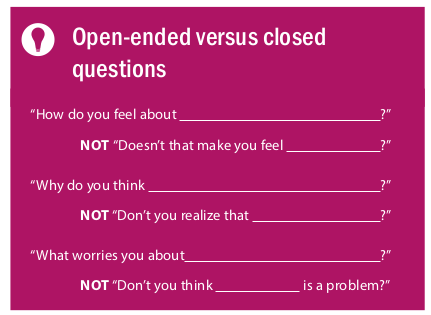
"We know when we've screwed up. We don't need to hear nearly it for hours. It's embarrassing plenty knowing we've done something we shouldn't take and that our parents are mad about it."
Responding to your kid's cannabis utilize
Discovering (or suspecting) your kid has been using cannabis or any other drug tin can be scary, especially if you sense that it is not just office of "normal" experimentation.
While it can be tough to resist the urge to get wild with worry or anger, the best matter you can exercise for your child is to respond responsibly. Information technology is important not to let your concerns harm the relationship and the trust y'all have with your kid.
Stay calm
Yelling and making threats volition non help the situation. If annihilation, "freaking out" volition give your child another reason to hide things from you. Searching their room or personal belongings may damage the trust between you lot and your child.
Talk to your kid
Sit down down with them and tell them how you experience. If they are high, look until the effects have worn off so you lot can accept a more meaningful word. Say, "I'thousand worried considering..." or "I'm afraid considering..." So give your kid an opportunity to express their own feelings. Make sure they know yous are really listening. And allow them time to retrieve things through before speaking.

Acquire why your child is using
Find out what led them to try cannabis in the kickoff place. Was it because their friends were using information technology and they wanted to fit in? Was information technology for the "buzz" that comes from having an altered state of consciousness? Was it considering they wanted a way to escape? Was information technology to manage symptoms of anxiety or other mental health problems? If so, you might want to consider seeking assistance from a mental health professional person. It may besides be helpful to find out how often your child uses cannabis.
Understand the difference betwixt a youth who uses drugs and a youth with a drug trouble
Young people use cannabis because they feel information technology benefits them. The virtually mutual reasons youth utilize cannabis are:
-
To feel adept—Youth may use cannabis to feel more social, celebrate or relax. Using cannabis to experience good is associated with moderate use. There is nevertheless some risk, as in that location is in life in full general.
-
To feel better—Cannabis can aid reduce anxiety in social situations or when trying to connect with others or reduce symptoms of chronic feet or depression. If young people use cannabis regularly to bargain with troubling feelings, and so utilise may go problematic.
-
To practice ameliorate—Some immature people experience force per unit area to improve their performance, "become going" or "go along going."
-
To explore—Immature people particularly may use cannabis out of curiosity or to "walk on the edge," trying something new and different.
It is important to keep in heed that sustained drug use issues are most mutual among people who feel isolated or marginalized. Youth without connections or meaningful relationships in their lives may seek solace in "experience-adept" drugs. On the other mitt, even well-connected young people can go into serious trouble from using too much or in the wrong place.
Offer alternatives
If your child is using drugs considering they similar the buzz, y'all may want to suggest activities that will naturally boost their adrenaline levels, such as rock climbing or mountain biking. If your kid is using cannabis to at-home themselves or to relieve feelings of anxiety, you could help them explore calming or meditative activities, such as yoga, running and swimming.
Lower the risks
A child who is using cannabis may need help learning to manage the risks and use the drug in the safest way possible. One way to assistance your kid lower the risks related to using cannabis is to have a conversation about safer ways to smoke (run across Quick tips for safer cannabis employ). Another manner is to discuss safer contexts and settings for apply. Assuasive your child to smoke cannabis at home may help to provide a safer surround just it is of import to counterbalance the risks involved.
If your child is engaging in risky activities such as using cannabis at school or selling cannabis, it is important to talk with them about why they are engaging in these activities and then that you tin can assess the level of risk, help them think through the consequences and identify alternatives. For example, if your child is selling cannabis to brand money, talk with them about safer ways to earn an income.
"It didn't make me want to apply drugs. I liked that they were honest with me."
Quick tips for safer cannabis use
-
Avoid smoking cannabis with tobacco
-
Avoid deep inhalation or breath-belongings
-
Use a vaporizer
-
If smoking cannabis, use joints rather than h2o bongs
-
Use a small piece of rolled unbleached cardboard as a filter to forestall burns
-
Only use cannabis purchased from a trusted source
"I wouldn't want my parents to tell me if they used drugs. I'd exist embarrassed."
Consider what to share (or not share) near your past
Many parents want to know if it is adept or bad to tell their children about their own experiences with cannabis or other drugs. The answer is "information technology depends on your child and situation."
I affair to think most is your motive for talking near your past. Are you telling them because you want to warn or frighten them in some style? Are you telling them because they asked and y'all practice not want to lie to them? Are y'all telling them because y'all feel it might heighten your relationship in some mode?
Another matter to consider is that some young people have a hard time seeing how any of their parents' experiences are relevant to those of young people today. They may simply tune out when they hear stories nearly your past because they run into no human relationship between then and now.
Keep the art of motivation in heed
While no parent is 100% responsible for their child's choices and behaviours, part of our job is to effort to influence our kids in positive means. 1 manner involves checking in with them about their goals—over the next semester or twelvemonth or even longer—and getting them to clear how their employ of cannabis or other drugs might affect those goals.
Taking a motivational approach is less virtually pressuring your child to change their cannabis use and more than about supporting their internal reflection on their possible demand and ability to alter. It means steering a conversation toward possibility and action. And it is light in spirit and tone considering it involves imagining success in the future.

In brusque, rather than brand your kid say and do what you want, assist them place what they want—to earn coin, become a commuter's licence or graduate from high school—and support their efforts. You might need to help them sympathise what is involved in reaching a goal, and help them place both internal and external resources they tin can draw on to ensure their success.
Give information technology time
Information technology will likely have more than one conversation for you to sympathize your child'southward drug use. But the good news is that, over fourth dimension, you might discover your kid has less of a trouble than you thought. That is, your teen could very well be experimenting with cannabis the way many young people do without ever developing a risky or harmful pattern of use.
If a harmful pattern is emerging, you will need to exist fifty-fifty more patient. But it may help to consider this: the path to your child's drug use took time to build, then it makes sense non to expect a quick fix. A harmful blueprint of drug use may be related to life challenges—feelings of failure or a lack of connection at school or with loved ones—that sometimes accept a great bargain of work to resolve. Information technology might even be related to physical and mental wellness issues.
Signs of risky or harmful cannabis utilize
-
using regularly at an early age
-
daily or near daily use
-
using during school or piece of work
-
using every bit a major form of recreation
-
using to cope with negative moods
-
experiencing chronic coughing, shortness of jiff, wheezing or psychotic symptoms
NOTE: A young person may take one or more of these signs without having a brusque-term or long-term problem with cannabis. However, the more signs, the higher the adventure.
Seek help
Not every parent is equipped to handle drug utilize problems on their ain. If y'all demand help understanding or communicating with your child, await for local resources and organizations that can assist you. You could try talking to
-
a school counsellor
-
your family doctor
-
your regional Wellness Say-so
-
the Alcohol and Drug Information and Referral Service at 1-800-663- 1441 (BC) or 604-660-9382 (Greater Vancouver)
"The counsellor helped my child run into he had other interests also cannabis. And we learned to look at things in a more balanced way. We realized our child had more than only his pot-smoking friends in his life. He also had his sports friends and many other associations with people who didn't apply cannabis."
Top
In summary, effort to remember...
Equally a parent, you are a powerful influence in your child's life. Your approach to life, and how you deal with adept things besides as difficulties, provides multiple opportunities for your children to learn how to be human, make mistakes (whether you want them to or not) and the process of making proficient decisions. Life presents united states of america with many challenges each day. How to deal with drugs, including cannabis, may be one of those problems.
At that place are many things to consider, and you may struggle to make good decisions about circuitous issues like cannabis. Responsibilities to protect, support, and guide your children must be balanced with your values and the changing social and cultural realities of the xx-first century. Reviewing your thoughts and feelings about cannabis, your personal history with it (did you use cannabis, do you all the same use it and why?) and the reasons your kid is using cannabis are important considerations in thinking about what to exercise.
Every bit noted earlier in this guide, young people use cannabis because they see benefit in doing and then. They use cannabis to feel adept, feel better, practice better or explore. Entering into dialogue with your child nearly the benefits they receive from using cannabis will help you to get together data and develop a mutual agreement that will help you make a good decision together well-nigh cannabis. In this process yous may likewise discover your child has mental or physical health problems which may need to be addressed. Discussing your and your kid's concerns in the context of an open up, caring and respectful relationship makes infinite for further dialogue on cannabis, and other problems that arise in the future.
For further information and supports please check out the resource listed on the following page.
Top
Resources
HERE TO Assistance
www.heretohelp.bc.ca
The following resources are bachelor on the Here to Help website:
-
Learn about... Cannabis
-
Substance Utilise and Young People: A Guide for Families and Their Caring Communities
-
Visions Journal – issue on Cannabis
-
ƒƒY'all and Substance Apply workbook
Other websites to visit
Canadian Institute for Substance Apply Research
www.cisur.ca
Dedicated to enquiry and noesis related to substance use, mental wellness and well-being. The CISUR website provides fact sheets and self-help tools to assistance British Columbians make decisions about their well-beingness. The site too includes resources to back up schools, campuses and communities to accept effective action in addressing the impact of substance use.
Canadian Mental Health Association (BC Partition)
www.cmha.bc.ca
Promotes the mental health of all British Columbians. The website provides cocky-help resource, personal stories and discussion of public issues related to mental illness, such as housing, employment and discrimination.
FamilySmart
www.familysmart.ca
Provides a variety of supports for families and those who work with families. The website includes resources to promote greater agreement and increased collaboration amid all involved in family well-being.
The Foundry
foundrybc.ca
Foundry offers young people ages 12-24 health and wellness resources, services and supports – online and through integrated service centres in seven communities across BC.
Kelty Mental Health Resources Centre
keltymentalhealth.ca
Offers information and resource on mental health and substance use issues affecting children and youth including resources for parents and caregivers, healthcare professionals, school professionals, youth and young adults.
Nearly the writer

The Canadian Institute for Substance Use Research, formerly CARBC, is a member of the BC Partners for Mental Health and Addictions Information. The institute is defended to the study of substance use in support of community-wide efforts aimed at providing all people with access to healthier lives, whether using substances or not. For more, visit www.cisur.ca.
© 2018 | Back to top | PDF | More than info sheets
Source: https://www.heretohelp.bc.ca/workbook/cannabis-use-and-youth-a-parents-guide
0 Response to "Atl School Cannabis Users Use 1 indica as Body or Physical Sensation Again Not Thinking"
Post a Comment